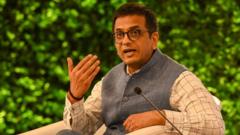Justice Dhananjay Yashwant Chandrachud’s recent retirement as India’s 50th chief justice raises critical questions about his impact on the judicial landscape. As he introspected before leaving office, he pondered how history would assess his time in a judicial role that has profound implications for India’s 1.4 billion people. His unique position as the first celebrity judge often made headlines, yet his decisions revealed a complex legacy.
Serving diligently for over eight years, including a two-year term as chief justice, Chandrachud was acknowledged for authoring 93 judgments—more than his last four predecessors combined. Advocating for digitization and transparency in the judicial process, he garnered praise for opening up court hearings to public access.
His leadership was seen as especially crucial during a politically charged climate, with the ruling Bharatiya Janata Party (BJP) facing accusations of undermining democracy. Advocates hoped that under his stewardship, the Supreme Court might turn into a stronger bulwark for fundamental liberties.
Yet, despite his progressive stance, including landmark decisions decriminalizing homosexuality and promoting gender equality, critics have voiced their discontent regarding his engagement with the government. Senior lawyer Kamini Jaiswal articulated a sense of disappointment with the former chief justice’s perceived failure to challenge government actions when necessary. Observers noted that while he laid down strong legal precedents, his rulings often leaned towards favoring state interests, leaving many feeling that he did not sufficiently uphold accountability.
His role as the master of the roster faced scrutiny as well, particularly concerning the prolonged detention of political prisoners. Some, including prominent legal voices, criticized him for not acting decisively enough to assist those in dire legal situations, sometimes leading to tragic consequences.
Outside the courtroom, personal choices also stirred public discourse. A video depicting him in a personal prayer session with Prime Minister Modi drew ire from varied sectors, claiming that it undermined the judiciary's independence. Similarly, a statement he made regarding divine intervention in sensitive cases provoked a wave of backlash that questioned the appropriateness of such comments from a high-ranking judge.
Justice Chandrachud addressed such criticisms, emphasizing that the separation of powers does not necessitate hostility between judiciary and executive arms of government. As he bid farewell, he maintained that he had left the judicial system in a better condition—a claim that remains divisive among legal experts and the public alike.
In an environment eager for judicial integrity and resistance against government encroachment, opinions about Justice Chandrachud's legacy are sharply dichotomous, embodying the tensions of a judiciary striving for independence amid political realities. As debates continue, his tenure serves as a pivotal reference point for future judicial leaders navigating similar complexities.



















